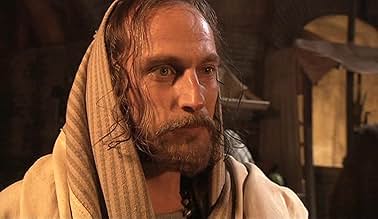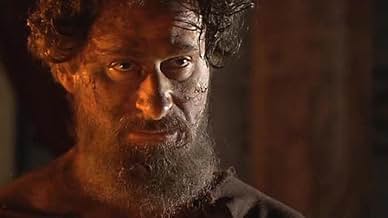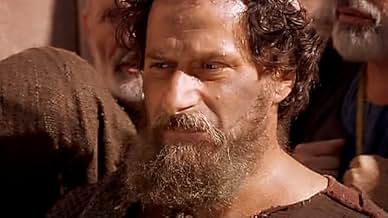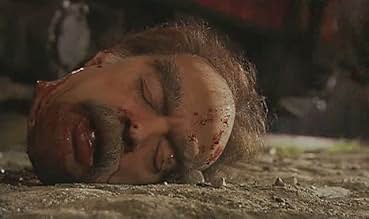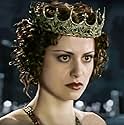Master i Margarita
- TV Series
- 2005
- 50m
IMDb RATING
7.5/10
5.2K
YOUR RATING
The devil and his attendants visit Moscow at the times of the Stalin regime. Official atheistic ideology confronts with a series of supernatural events.The devil and his attendants visit Moscow at the times of the Stalin regime. Official atheistic ideology confronts with a series of supernatural events.The devil and his attendants visit Moscow at the times of the Stalin regime. Official atheistic ideology confronts with a series of supernatural events.
- Awards
- 3 nominations total
Browse episodes
Featured reviews
"Master and Margareth" has always been my favorite book. I have read a lot of books, and none of them had captivated and haunted me in such a way that I would read it again and again and again. It is one of the most unusual and mysterious books ever written in the 20th century. And, finally, there is a movie which is as close to the original as possible. To be honest, there is a lot of really bad movies made in Russia, and most of them are so dreadful that it should be made illegal to pocess them! "Master and Margareth" is a pleasant and distinguished exemption from the endless flood of utterly horrible junk which is called Russian film-making. I really loved the movie. The actors are great, digital photography and the special effects aren't so bad either. Of course, it could have always been better but Russian films never have the same budget as an average Hollywood flick. I enjoyed the way the movie turns from B&W to color and opposite. And the soundtrack is amazing. They should release it separately on a CD.
This long awaited version does not mean that you don't need to read the book. No matter how perfect the adaptation is (it is far above excellent in this case), it can never replace the original. If you've never read it, do yourself a favor and do it as soon as possible. If you had read it before, it is really worth giving it another go. If you do it once every 5-10 years, you will definitely find something new in it.
Finally, it has been released with English subtitles. It would not be really fair to all English speaking scholars, researchers and Bulgakov's lovers who otherwise wouldn't have been able to watch this masterpiece.
This long awaited version does not mean that you don't need to read the book. No matter how perfect the adaptation is (it is far above excellent in this case), it can never replace the original. If you've never read it, do yourself a favor and do it as soon as possible. If you had read it before, it is really worth giving it another go. If you do it once every 5-10 years, you will definitely find something new in it.
Finally, it has been released with English subtitles. It would not be really fair to all English speaking scholars, researchers and Bulgakov's lovers who otherwise wouldn't have been able to watch this masterpiece.
The user review first to pop up when one opens the IMDb page is not only unfair, but IMHO idiotic. This is a masterpiece you MUST see.
As everybody who has read the novel knows (and I have read it at least four times), Master i Margarita is a 20th century masterpiece, perhaps THE 20th century masterpiece as far as novels are concerned. Theoretically, it is impossible to adapt to film. Yet Vladimir Bortko managed in this mini-series to convey to the viewer all the magical beauty, as well as the penetrating political satire, of the novel.
Of all the scenes/themes of the novel, only a single one is missed: the hoarders of hard currency locked in a theater for re-education and recanting. It is an inexplicable omission, however it does not affect the value of the mini-series. Then there are matters where one cannot follow Vladimir Bortko, as for instance the (IMHO) inconsistent alteration between BW and color. But just watch the mini-series, and you are lifted into a world of magic - magic realism for that matter. All actors are accomplished theater actors: close your eyes and you can imagine them playing Chechov on stage. The Russian they speak is seductively beautiful. I do not speak the language, and mini-series like this make me regret it: a friend of mine (native speaker) who watched it together with me was constantly laughing or frowning at parts of the video where the English subtitles gave no clue of anything. And, from a male viewer's perspective (Bulgakov was if anything a skirt chaser), you have to watch it even just for the pleasure of voyeurism. Anna Kovalchuk as Margarita is fragile, beautiful, erotic, daemonic: the woman you had always wished you had loved, and be loved by her in return. Dela the witch/vampiress is extremely seductive. And the eroticism of some scenes, most notable the Spring Ball with all these beautiful women clad only in jewelry, feathers and stiletto high-heels is, I think, impossible to beat.
I give it only 9/10, because 10/10 goes to the novel.
As everybody who has read the novel knows (and I have read it at least four times), Master i Margarita is a 20th century masterpiece, perhaps THE 20th century masterpiece as far as novels are concerned. Theoretically, it is impossible to adapt to film. Yet Vladimir Bortko managed in this mini-series to convey to the viewer all the magical beauty, as well as the penetrating political satire, of the novel.
Of all the scenes/themes of the novel, only a single one is missed: the hoarders of hard currency locked in a theater for re-education and recanting. It is an inexplicable omission, however it does not affect the value of the mini-series. Then there are matters where one cannot follow Vladimir Bortko, as for instance the (IMHO) inconsistent alteration between BW and color. But just watch the mini-series, and you are lifted into a world of magic - magic realism for that matter. All actors are accomplished theater actors: close your eyes and you can imagine them playing Chechov on stage. The Russian they speak is seductively beautiful. I do not speak the language, and mini-series like this make me regret it: a friend of mine (native speaker) who watched it together with me was constantly laughing or frowning at parts of the video where the English subtitles gave no clue of anything. And, from a male viewer's perspective (Bulgakov was if anything a skirt chaser), you have to watch it even just for the pleasure of voyeurism. Anna Kovalchuk as Margarita is fragile, beautiful, erotic, daemonic: the woman you had always wished you had loved, and be loved by her in return. Dela the witch/vampiress is extremely seductive. And the eroticism of some scenes, most notable the Spring Ball with all these beautiful women clad only in jewelry, feathers and stiletto high-heels is, I think, impossible to beat.
I give it only 9/10, because 10/10 goes to the novel.
I watched this mini on a DVD so my perception wasn't as fragmented as it perhaps would have been if I watched one episode a day on TV. I read 'Master and Margarita' at least ten times so I know it pretty much by heart. It came as a relief that Bortko followed the original text so closely and didn't turn it in one of Hollywood 'junk' adaptations. There's no point in getting hysterical about the fact that this film is not as good as the book it could never be. I agree with other comments here that many dialogues are 'still born' because the text was transferred from the book too literally with no dramatic adaptation, particularly when Bulgakov's 'author's' commentaries were used in the dialogues. Abdulov and Basilashvili were the best. To my mind, Basilashvili, in particular, added to my previous perception of Woland and expanded this character if that's at all possible. The main complains are Begemot all of whose personifications failed miserably and Gaft's character who was completely out of context and rather weird. Gaft already played Beria in another movie and his appearance here looked like a piece cut out from that movie and pasted into this one. However this is all minor and generally I enjoyed the film. I was only really disappointed with Bortko's interpretation of the Ball. Having followed the book so maniacally to the last letter he suddenly deviated off track and not in a good way. In Bulgakov's book the Ball is an explosion of colour, light and music with walls of flowers and rainbow fountains. Whether it was a poor budget to blame or inability to use decent special effects but Bortko created some grey depressing place in the middle of nowhere which looked rather bizarre. Bulgakov featured Margarita flying through the ball halls in shoes made of rose petals and wearing nothing except heavy pendant over her neck whereas Bortko dressed her in torture chains and pinned her to the ground. It all looked a bit sado-masochistic and I doubt Bulgakov saw it that way. I'm surprised no one here commented on it. All in all I think it's not a bad attempt, certainly for a mini. I was expecting something much worse having seem some of the rubbish produced my Russian movie makers these days. To those who say it's awful, I think you should calm down and accept that Bulgakov's book and this movie are completely separate entities and the film can't be as deep because it can't reproduce all the philosophical richness of the literary work. It could try but then it won't appeal to a wider audience which prefers easily digestible adaptations.
This TV-series of 10 episodes, broadcast at the end of 2005 on the Russian Telekanal Rossiia, scored unprecedented ratings.
It was the second attempt of director Vladimir Bortko to film Bulgakov's masterpiece. In 2000 he had already been solicited by the Kino-Most film studio, associated with the competing channel NTV, but at the last moment the company did not succeed to come to an agreement with Sergei Shilovsky, grandson of Bulgakov's third wife, and owner of the copyrights. This time, with Rossiia, it worked. And it did not pass unnoticed.
This TV-epopee of more than 8 hours was heavily criticized, or at least regarded with much skepticism, before it was shown on screen. Sometimes it was sincere and well-grounded concern about the authenticity, but sometimes it seemed as if the Bulgakov die-hards behaved like modern Latunsky's by reproaching a movie they hadn't seen yet with sacrilege. Or maybe it was because of the gigantic publicity campaign that was launched to promote the series, and that could give reasons to fear an ambitious, but superficial Hollywood-ish production. But fortunately it wasn't the case.
In contrast with the earlier screen adaptation of Aleksandar Petrovic in 1972, director Vladimire Bortko (° Moscow, 1946) followed the book meticulously. If you have 10 times 52 minutes available for it, it is of course, easier than when you're supposed to deliver a 90 minutes movie picture. The setting of a TV-series appeared to be an ideal format to elaborate the complicated, multidimensional work with many different characters. Bortko had already shown his talent with his TV-adaptation of Fyodor Dostoevsky's The Idiot in 2003. Besides, he already filmed another novel of Bulgakov before: "Heart of a Dog", in 1988. He followed the dialogues almost word for word because, so he said, Bulgakov wrote the novel almost like a screenplay.
Ik was skeptical too when I saw the DVD at дом книги (Dom Knigi or "House of Books") in Moscow. But curiosity was stronger than skepticism and, frankly speaking, I was pleasantly surprised from the first images. Woland's meeting with Ivan and Berlioz, and the first confrontation of Pilate and Yeshua Ha-Notsri are not only beautifully portrayed and well performed, but in addition they matched remarkably well with the images that I had in mind when I first read the book.
The three layers of the novel are reflected more than well, with a well manipulated alternation of colour and black-and-white. The actors are casted accurately and they play the characters faithfully to the novel's intentions that even the most convinced skeptics shut their mouths, despite the huge success on December 29, 2005 more than 80 million people were watching.
Must I find demerits? Well... maybe the depiction of Behemoth then. With the existing technologies it could have been done better, but after all I can only conclude that, even though it is "only" TV, this series doesn't disenchant and its main merit is probably the the fact that Bulgakov now found a much bigger audience than he ever could have had with his books.
It was the second attempt of director Vladimir Bortko to film Bulgakov's masterpiece. In 2000 he had already been solicited by the Kino-Most film studio, associated with the competing channel NTV, but at the last moment the company did not succeed to come to an agreement with Sergei Shilovsky, grandson of Bulgakov's third wife, and owner of the copyrights. This time, with Rossiia, it worked. And it did not pass unnoticed.
This TV-epopee of more than 8 hours was heavily criticized, or at least regarded with much skepticism, before it was shown on screen. Sometimes it was sincere and well-grounded concern about the authenticity, but sometimes it seemed as if the Bulgakov die-hards behaved like modern Latunsky's by reproaching a movie they hadn't seen yet with sacrilege. Or maybe it was because of the gigantic publicity campaign that was launched to promote the series, and that could give reasons to fear an ambitious, but superficial Hollywood-ish production. But fortunately it wasn't the case.
In contrast with the earlier screen adaptation of Aleksandar Petrovic in 1972, director Vladimire Bortko (° Moscow, 1946) followed the book meticulously. If you have 10 times 52 minutes available for it, it is of course, easier than when you're supposed to deliver a 90 minutes movie picture. The setting of a TV-series appeared to be an ideal format to elaborate the complicated, multidimensional work with many different characters. Bortko had already shown his talent with his TV-adaptation of Fyodor Dostoevsky's The Idiot in 2003. Besides, he already filmed another novel of Bulgakov before: "Heart of a Dog", in 1988. He followed the dialogues almost word for word because, so he said, Bulgakov wrote the novel almost like a screenplay.
Ik was skeptical too when I saw the DVD at дом книги (Dom Knigi or "House of Books") in Moscow. But curiosity was stronger than skepticism and, frankly speaking, I was pleasantly surprised from the first images. Woland's meeting with Ivan and Berlioz, and the first confrontation of Pilate and Yeshua Ha-Notsri are not only beautifully portrayed and well performed, but in addition they matched remarkably well with the images that I had in mind when I first read the book.
The three layers of the novel are reflected more than well, with a well manipulated alternation of colour and black-and-white. The actors are casted accurately and they play the characters faithfully to the novel's intentions that even the most convinced skeptics shut their mouths, despite the huge success on December 29, 2005 more than 80 million people were watching.
Must I find demerits? Well... maybe the depiction of Behemoth then. With the existing technologies it could have been done better, but after all I can only conclude that, even though it is "only" TV, this series doesn't disenchant and its main merit is probably the the fact that Bulgakov now found a much bigger audience than he ever could have had with his books.
just a masterpiece. as adaptation of a masterpiece. the key - high loyalty to the book. and the science to resurrect an universe who becomes fascinating in this trip across characters and magnificent images and spectacular artistic options and wise choices for the portrait of each character. more than a masterpiece, it is a refined delight. and this detail did it great. because it reflects the profound respect of Russian cinema for the national literature. and, in same measure, the science to build a fresco.
Did you know
- TriviaThe film contains 163 minutes of special computer generated effects.
- ConnectionsFeatured in Legendy mirovogo kino: Kirill Lavrov
Details
- Release date
- Country of origin
- Official site
- Language
- Also known as
- The Master and Margarita
- Filming locations
- Production companies
- See more company credits at IMDbPro
- Runtime
- 50m
- Color
- Sound mix
Contribute to this page
Suggest an edit or add missing content

